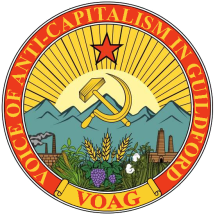John Riddell, a Canadian Marxist, is the foremost historian of the Comintern and translator of its proceedings. His article is reproduced, without permission, to inform the debate amoungst activists in Guildford,
Five precedents for understanding Egypt’s July coup
By John Riddell, September 15, 2013
Two months after Egypt’s generals ousted its elected Muslim Brotherhood government, there is still a wide spectrum of views among socialists regarding the meaning of this event. (See my “Egypt: Socialists Need to Rethink”) This discussion can be deepened by considering a few precedents from socialist history – some well known, others obscure.
1. 1917: The Kornilov coup
My first and best-known example of workers’ response to an attempted rightist coup took place a year and a half before the Comintern was founded. In August 1917, workers and soldiers in Russia united to block an attempted coup by General Lavr Kornilov against the Provisional Government of Alexander Kerensky. At the time, Kerensky’s regime, a coalition of reformist and bourgeois forces, was blocking progress on key revolutionary goals like peace and land reform while repressing the Bolsheviks and other revolutionary forces.
The Bolsheviks recognized that the working class, not Kerensky, was the real target of the reactionary military forces. Together with most other Left currents and in alliance with Kerensky, the Bolsheviks rallied workers to oppose the coup. Workers won a quick victory, while the Bolsheviks and their allies gained respect and confidence from the masses. This outcome set the stage for the Russian soviets to assume power two months later.
2. 1920: The Kapp putsch
Two years later, workers in Germany faced a similar situation. A Social Democratic-led government had waged a brutal war against revolutionary workers and was building up the state’s forces of repression. On March 13, 1920, however, far-right forces made a bid for power. They led army detachments in seizing the capital, seeking to replace constitutional government with military dictatorship. The coup became known by the name of one of its leaders, Wolfgang Kapp. Trade unions reacted to the coup with a call to general strike. Amazingly, the German Communist party (KPD) called on workers not to take part in the struggle. The strike was immensely powerful, and the KPD rapidly rectified its stance. Only four days into the strike, the coup regime was toppled. (The story of the Kapp Putsch is well told in chapter 18 of Pierre Broué’s masterly history, The German Revolution 1917–23, Merlin: 2006.)
Despite their initial error, the Communists played a leading role in several aspects in the anti-Kapp movement. In one important industrial city, Chemnitz, the KPD led workers’ councils, representing all workers’ parties, in forming a municipal government during the period of most intense struggle. Communists took part in armed workers’ detachments that, for a time, drove the army out of significant areas of the country. At one point, the KPD gave guarded support to a union call for a government of unions and workers’ parties.
During the Kapp struggle, workers in action provided clear answers to a series of strategic issues that were much debated in the Comintern at that time: united front, response to rightist coups, and governmental power. However, after an initial flurry of debate, the Kapp experience was rarely mentioned in Communist International discussions, and its lessons were not assimilated.
Drawing the parallel
There are striking similarities between the Kornilov and Kapp experiences and the military takeover in Egypt. Still, I have seen only one attempt to draw the parallel: by Vancouver-based socialist Roger Annis.
A few days after the Egyptian takeover, Annis wrote of the Kornilov and Kapp coup attempts: “These were both cases of military intervention by the old orders to try and forestall and ultimately destroy developing revolutionary situations. The Russian and German military officers played on political deadlocks in the respective political situations in which neither the capitalist nor the working classes could deliver a decisive blow that would decide who would rule. In both cases, the immediate targets of intervention were discredited or increasingly unpopular governments led by social democrats or political equivalents.” The Egyptian situation is different in important ways, Annis says, but “perhaps there are useful analogies here.”
3. 1923: Abstention in Bulgaria
During the Comintern’s early years, its Bulgarian section, a formidable mass party, was widely regarded as the Communist movement closest to the Bolsheviks in history and outlook. Bulgaria was ruled from 1919 by a radical peasant party, the Agrarian Union, led by Alexander Stamboliski. Threats of a rightist coup against his regime did not, however, lead to an effective alliance between the peasant forces and the Communist Party. By late 1922 the Agrarians and Communists were locked in enmity.
Elections were held April 1923, and the Agrarians were re-elected with an absolute majority of the vote. Two months later, the rightist bourgeois opposition mounted a coup to oust the peasant government. Resistance was crippled by abstention of the Communist Party, which declared its neutrality. The Stamboliski government had “used its power to defend its class and clique interests,” the party declared. “The working masses in town and village will not participate in the armed struggle … between the urban and rural bourgeoisie,” it stated. (Joseph Rothschild, The Communist Party of Bulgaria, p. 120) The coup triumphed rapidly.
The Comintern Executive Committee sought to convince the Bulgarian party of its disastrous error. The response in Bulgaria to this critique, however, was a premature and poorly prepared attempt at an uprising by the Communist forces alone, which was quickly suppressed. The Comintern response to this fiasco was ambiguous. Comintern President Gregory Zinoviev endorsed the Bulgarian party’s conduct, while the Comintern’s representative in Bulgaria condemned the party for “having shown itself incapable of maneuver and of leading the mass movement.” (Broué, Histoire de l’Internationale Communiste 1919–1943, pp. 333–35)
4. 1926: A ‘socialist’ general’s coup in Poland
In our fourth example, Communists in Poland actually fought alongside rebel army detachments in a brief civil war against defenders of a constitutionally established but discredited bourgeois government. The coup’s leader, Joseph Pilsudski, reputedly represented the bourgeoisie’s more progressive wing. Indeed, Pilsudski had long been a leader of right-wing Socialist forces in Poland, before emerging as the leader of Polish armed forces on the Austro-Hungarian army during World War 1 and then as the president of newly independent Poland from 1918 to 1922.
In 1926, Poland was gripped in economic crisis. Its rightist government, just installed, was displaying authoritarian ambitions. Pilsudski, formally retired, in fact led and inspired the bourgeois opposition. The Communist Party declared conditional support for Pilsudski’s movement, “if they fight to defend democratic institutions.” On May 13, troops loyal to Pilsudski rose in revolt; the Communist and Socialist parties declared a general strike in their support. The strike, widely effective, was decisive in enabling the rebels to win out in a four-day civil war. Although Communists fought on the rebel side, they were being arrested by Pilsudski’s forces even before fighting ended. Pilsudski’s regime, which lasted until his death in 1935, preserved some democratic forms but was heavy-handed and repressive toward the working class.
Party members quickly regretted what they ruefully called their “May mistake” but differed in explaining what the mistake was. By now, the Comintern was deeply influenced by Stalinism, which obstructed a correction. In 1927, an ultraleft current took the party’s helm, wrongly explaining the Pilsudski movement to be “fascist.” (Broué, Histoire, pp. 472–75)
5. 1932. Germany’s ‘red referendum’
Six years later, the German Communist Party launched a campaign in support of a Nazi initiative to unseat the Social Democratic-led government of Prussia, the state containing two-thirds of the German population and its capital, Berlin. By this time, the Comintern had embraced Stalin’s assertion that Social Democracy represented another form of fascism, “social fascism,” which had to be opposed as strongly as the Nazis. The Communist Party claimed it would transform the Nazi initiative into a “red referendum” for workers’ rule.
The Nazi initiative was not in itself a coup, but it was an important step along the road to fascist power. If the referendum had won, it would have forced new elections, which the Nazis and their allies felt sure they would win. Even with Communist support, however, the Nazi campaign fell short, winning 38% of the vote.
The Communist Party declared the result to be a victory, “the greatest blow of all that the working class has yet dealt Social Democracy.” Trotsky commented, “The most rabid foe could not have thought up a surer way of inciting the Social Democratic workers against the Communist Party and of holding up the development of the policy of the revolutionary united front.” (Tony Cliff, Trotsky: 1929-40)
It was three years before the Comintern abandoned this sectarian approach – only to flip over to a “people’s front” policy that aimed for alliances with parties of the imperialist bourgeoisie.
Summary
What can be learned from these disparate examples? Some conclusions:
· None of these examples is fully comparable to the events in Egypt. There is no textbook here.
· Even in the Comintern’s best years, its parties sometimes, under the pressure of events, became entangled in complicity with right-wing military coups.
· In every such case, Communists soon realized that involvement or tacit support had been a serious error.
· The most damaging aspect of these episodes was not the error itself but the failure to correct it clearly and openly.
This article is reproduced, without permission, to inform the debate amoungst activists in Guildford,



 To get a sense of how radical the Bank’s new position is, consider the conventional view, which continues to be the basis of all respectable debate on public policy. People put their money in banks. Banks then lend that money out at interest – either to consumers, or to entrepreneurs willing to invest it in some profitable enterprise. True, the fractional reserve system does allow banks to lend out considerably more than they hold in reserve, and true, if savings don’t suffice, private banks can seek to borrow more from the central bank.
To get a sense of how radical the Bank’s new position is, consider the conventional view, which continues to be the basis of all respectable debate on public policy. People put their money in banks. Banks then lend that money out at interest – either to consumers, or to entrepreneurs willing to invest it in some profitable enterprise. True, the fractional reserve system does allow banks to lend out considerably more than they hold in reserve, and true, if savings don’t suffice, private banks can seek to borrow more from the central bank.
 Don’t Vote UKIP Don’t Vote Alexandra Swann: As UKIP Asks Should The Unemployed Be Allowed To Vote
Don’t Vote UKIP Don’t Vote Alexandra Swann: As UKIP Asks Should The Unemployed Be Allowed To Vote













You must be logged in to post a comment.